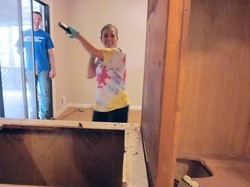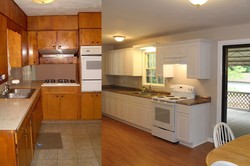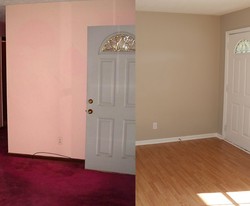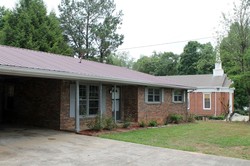An active and growing church. A recently vacated adjacent home. An expected need for additional parking. A match made in heaven?
For Kirkwood Presbyterian Church in Kennesaw, Ga., the chance to purchase the lot and home next door in 2013 was a golden opportunity. Although it had no immediate plans to expand its facilities, the congregation voted unanimously in February 2014 to purchase the land based on future needs.
Kirkwood’s pastor, the Rev. Catherine Renken, explains that the church is built on a slope and isn’t particularly handicap accessible. Some long-range goals included converting the level lot next door into more-accessible parking or using the home for additional meeting space or Sunday school rooms.
Yet none of these needs were urgent concerns for the congregation. So, following the purchase, the home sat unused until January 2015, when Renken said to herself, “This is ridiculous; we have to do something.”
Renken remembered a call she’d received from Family Promise of Cobb County, wondering if Kirkwood could serve as a host for families working their way out of homelessness. Renken declined participation, since the church has no showers and all its spaces large enough to host families overnight were being used for community meetings such as Alcoholics Anonymous. But this new property, she believed, could be of some use to Family Promise.
Renken says that when she contacted Family Promise executive director Camilla Worrell, her response was, “We’ve been praying for this—we’ve been looking for a transitional home for our graduates!”
Family Promise’s mission is to help homeless families with children “achieve adequate and consistent income, stable housing, and lasting independence by mobilizing [the] local interfaith community to provide temporary emergency meals, shelter, compassionate hospitality, and professional services.”
A Promise House committee was soon formed at the 162-member congregation to explore the partnership. Within a month, Worrell notified the church that Home Depot had partnered with the project to supply materials and labor to remodel the 1969 ranch-style home that was in desperate need of updates.
Renken says Home Depot’s contribution to the project was “way more” than the church could afford. Everything from new flooring to decking, paint and construction materials, even brand new appliances, were donated by four Home Depot stores in the area.
“They installed the hardwood floors. They installed the appliances. They installed the countertops and the knobs,” she says of the effort Home Depot put into the remodel. “There were many days where the manager of the Home Depot store was over there just by himself working.”

The Rev. Catherine Renken, pastor of Kirkwood Presbyterian Church, uses a sledgehammer to demolish the old kitchen in Promise House. —Kirkwood Presbyterian
Renken got involved as well, checking with the construction manager to see if they could open up the kitchen and dining room area. After verifying replacement cabinets were in the budget, she put her own hand to the sledge to help with demolition. “It was hideous—not functional,” she says of the original kitchen.
Steve Nielson, chair of the Promise House committee at Kirkwood, says the outpouring of volunteers from the community was inspiring.
“To date, more than 92 people have touched Promise House,” he says. “About half of those are Kirkwood members; the others are either members of other denominations or non-churchgoers. This involvement is the greatest testament to the work and project.”
The combined volunteer efforts of Home Depot, Family Promise and Kirkwood Presbyterian made quick work of the demolition and remodeling, bringing a fresh and contemporary look to the three-bedroom, one-and-a-half bath home that Renken described as a “time capsule from 1969.” The home passed final inspections in late May, was dedicated May 31 and will receive its first residents within the week.
Family Promise requires transitional residents to pay rent as they prepare for life beyond the supervision of the Family Promise program. In Kirkwood’s case, residents will pay $400 per month in addition to utilities. That will go a long way toward helping Kirkwood pay the $600 monthly mortgage on the property that was purchased for $96,000, with the congregation putting $50,000 toward the purchase price.
But Renken says the church never envisioned the home would be a moneymaking venture.
“We tried to convince Family Promise to allow people to live in the home rent free, as a ministry of the church,” she says. “But they insisted that residents pay rent to establish good patterns, learn responsibility and prepare for budgeting beyond subsidized housing.”
“Family Promise has been amazing in stepping up to say they will handle the tenants,” Renken says of the lease-landlord arrangement with the organization. “They have a very strict covenant that they make their tenants sign. It includes things beyond no smoking and no pets, but they can’t have visitors unless they get written approval from Family Promise. There’s no alcohol. And they engage with Family Promise through the process, including handing over their check from work so Family Promise can walk them through the process of maintaining a budget.”

Before and after images of the Promise House kitchen. —Kirkwood Presbyterian
She applauds the Family Promise model, saying it gives families a base from which to launch out of the program with a credit history, a rental record, and skills and habits that will help them manage their household.
“God has beautifully orchestrated this project in ways beyond our own imagination,” says Renken. “We had no idea how exactly we were going to use this property when bought it. We hadn’t outgrown our current building, our pockets were not overflowing, and we didn’t know about the needs in our community for affordable housing.”
As she reflects on the project, Renken expresses amazement at the amount of support it received from the people of Kirkwood Presbyterian—not because she doubted the congregation’s generosity, but because of how passionate members were to use the property for ministry.
“[The project] has provided so much energy and enthusiasm for mission,” she says. “New members, long-term members who haven’t been as active—it simply has provided a chance for people to be hands-on. We offered a day where we said, ‘Hey, come and paint,’ and people could just show up and paint. They didn’t need any history with the church or experience with teaching or any preparation.”

Before and after images of the Promise House living room entry. —Kirkwood Presbyterian
Susan Miles, a Kirkwood member who helped document the remodel process and register volunteers, agrees. “The real benefit to us is having a mission close to us where we can see the blessing grow. We saw church members get involved in a project that helped others and not just us.”
Renken says the congregation was clear in its motivation and purpose for the project, recalling the meeting that decided the adjacent home’s use. “When the decision came before session about moving forward with Family Promise, some of the elders, who tended to be more reserved, started quoting Scripture.”
“They said: ‘Jesus told us to clothe the naked and to help the poor and to feed the hungry and to use what we have for those in need. We have this [property], and there are people in need.’ It was a mutual feeling for everyone on session.”

